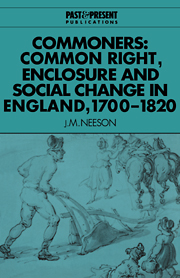Book contents
- Frontmatter
- Contents
- List of tables
- Preface
- Introduction
- 1 The question of value
- I SURVIVAL
- 2 Who had common right?
- 3 Threats before enclosure
- 4 Ordering the commons
- 5 Enforcing the orders
- 6 The uses of waste
- II DECLINE
- III CONCLUSION
- Appendix A Using the Land Tax
- Appendix B Acreage equivalents
- Appendix C Correcting and editing the Land Tax
- Appendix D Landholding estimates
- Bibliography
- Index
- Past and Present Publications
2 - Who had common right?
Published online by Cambridge University Press: 01 February 2010
- Frontmatter
- Contents
- List of tables
- Preface
- Introduction
- 1 The question of value
- I SURVIVAL
- 2 Who had common right?
- 3 Threats before enclosure
- 4 Ordering the commons
- 5 Enforcing the orders
- 6 The uses of waste
- II DECLINE
- III CONCLUSION
- Appendix A Using the Land Tax
- Appendix B Acreage equivalents
- Appendix C Correcting and editing the Land Tax
- Appendix D Landholding estimates
- Bibliography
- Index
- Past and Present Publications
Summary
Eighteenth-century writers said that commoners were small farmers, artisans, tradesmen, and the labouring poor, many of whom commoned without land. And, although they disagreed about the value of common right compared to a regular wage, they did not disagree about the survival, the useful or barbaric ubiquity of commoners. Far more than these writers, historians have disagreed about the value of common right. How have they described the identity and ubiquity of commoners?
‘In the open field village’, Gilbert Slater wrote, ‘the entirely landless labourer was scarcely to be found. ’ Accordingly, where land brought common right, commoners were many. The Hammonds went further: few villagers got nothing from the common; it was the ‘patrimony of the poor’, even those without land might have commons: ‘Were there any day labourers without either land or common rights in the old village? It is difficult to suppose that there were many.’ Lord Ernie, and J.D. Chambers in his early writing, agreed.
Sir John Clapham also thought that commoners were ubiquitous. But he added two qualifications. First, they commoned by custom not right. And custom was illegal. Second, so valuable a custom as to keep a cow was rare. In well-populated arable areas the right to graze a cow had never been universal. Arthur Young was wrong, he said, to claim that in nineteen enclosures out of twenty the poor lost commons for their cows: ‘Cows were not so common as that.’
- Type
- Chapter
- Information
- CommonersCommon Right, Enclosure and Social Change in England, 1700–1820, pp. 55 - 80Publisher: Cambridge University PressPrint publication year: 1993

